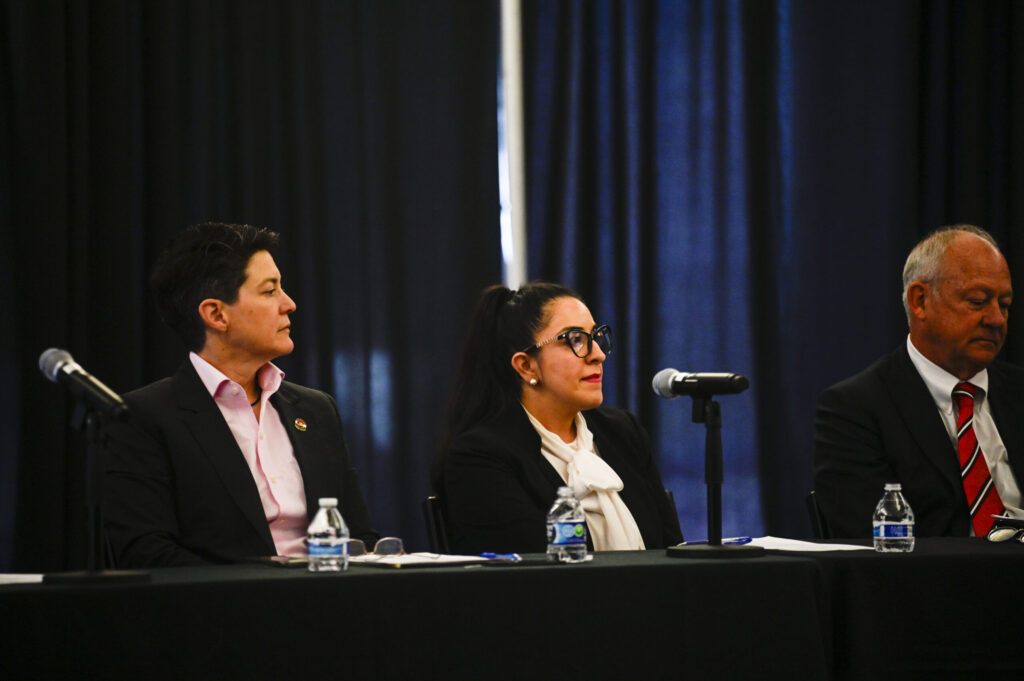Colorado Supreme Court skeptical of broad municipal power to permit violations of state noise limits
Members of the Colorado Supreme Court attempted on Thursday to decipher a 38-year-old amendment to the state’s noise pollution law to determine if local governments may permit any for-profit entity to host events on private property that exceed the statewide decibel limits.
In doing so, multiple justices were openly skeptical of the city of Salida’s representation that abiding by Colorado’s noise limitations for entertainment events would decimate the Salida Creative District.
“It seems to me it doesn’t have to be such an awful outcome. It just means events have to occur at lower decibel levels and arguably everyone’s a winner,” said Justice William W. Hood III at oral arguments. “There’s a lot more to the arts district than outdoor music. There’s lots more nice about Salida beyond that.”
“Speaking with any person from Salida,” responded attorney Erica Romberg, “the live music aspect has become so ingrained in the culture of the community, that to lose that would be detrimental.”
The question of how broadly local governments may deviate from state law has split the state’s second-highest court, with two recent appeals resulting in opposite interpretations of Colorado’s Noise Abatement Act.
The act sets decibel limits for classifications of property. However, lawmakers enacted a 1987 amendment jokingly named the “Fiddler’s Green bill” — a reference to the Greenwood Village amphitheater that would open the following year. The amendment rendered the Noise Abatement Act’s limits inapplicable to the “use of property by” the government, nonprofits, or their “licensees” and “permittees” when holding concerts and music festivals. The change also clarified that local governments retain the authority “to regulate noise abatement.”
The wording of the law suggested multiple potential outcomes:
• Any property could exceed the state decibel limits if used by the state, local governments, nonprofits or entities that receive a license, lease or permit from them for cultural events; or
• Any property used by the state, local governments or nonprofits for cultural events could exceed the decibel limits — with entities that receive a related license or permit from them included in that exemption
One Court of Appeals panel decided in March 2024 that localities do have broad permitting power for private property. In that case, attorney Matthew Hobbs sued Salida for authorizing the nearby High Side! Bar & Grill to hold summer concerts with noise levels exceeding the state caps.
By 2-1, the panel believed the law was intended to give local governments flexibility to regulate cultural and entertainment events, with objectors able to voice their concerns to city officials.
“The fact that such a remedy does not always lead to the particular result desired by a particular party does not mean that the statute, or the political process that it contemplates, is absurd,” wrote Judge Timothy J. Schutz for the majority.
Three months later, a different appellate panel concluded local governments cannot provide exemptions for land used exclusively by for-profit entities.
On appeal, Hobbs’ lawyers argued the 1987 amendment giving local governments flexibility to permit violations of the statewide limits did not universally extend to all event promoters on all types of property.
“If you review the committee and floor debate, every example given was of a political subdivision, the state or a nonprofit — specifically Fiddler’s Green — hosting or promoting some type of event,” said attorney Julian R. Ellis Jr.
In his view, if Salida or a nonprofit wanted to host an event using High Side! facilities, they were within their rights to receive an excessive noise permit.
“Had Salida done a contract with High Side! to do an event in Salida’s name — ‘We’re gonna put on a Celebrate Salida Day and we’ll do it at High Side!’ — that would be OK in your view?” asked Justice Richard L. Gabriel.
Correct, said Ellis, because the city would “take ownership of” the excessive noise.
Justice Melissa Hart, however, focused on the Noise Abatement Act’s provision that it “shall not be construed to preempt or limit the authority” of local governments to regulate noise.
“It seems pretty straightforward to me,” she said.
Meanwhile, the justices appeared more skeptical of Salida’s broad reading of its power to bless noise violations.
The “heart” of the case, argued Romberg, is, “What is a locality’s ability to bring arts into their community?”
Chief Justice Monica M. Márquez cut her off to say the narrow issue was about noise. If the 1987 amendment simply allowed local governments to exempt any event, “Why pack all that other language into that provision?” she asked.
After Romberg suggested any other interpretation of the amendment was unreasonable, Gabriel pointed out a three-judge Court of Appeals panel and one dissenting appeals judge in the Salida case all sided against the argument the city was making.
“You’re asking us to conclude four judges on the Court of Appeals are unreasonable. That’s troubling,” he said.
Romberg responded the consequences would be unreasonable.
“By requiring the municipality, the state, to be involved in these events, you’re taking resources from these smaller communities,” she said. “The staff resources, the time of the people.”
“You seem to be making a policy argument,” observed Hood. “Why should we resolve that policy debate in Salida’s favor?”
Arguments took place at Falcon High School in El Paso County as part of the judiciary’s “Courts in the Community” programming.
The case is Hobbs v. City of Salida et al.
Colorado Politics Must-Reads:














